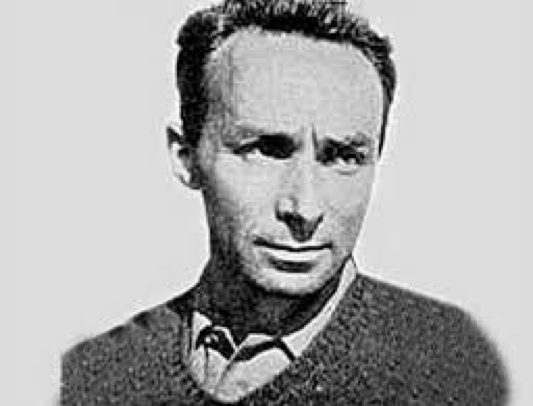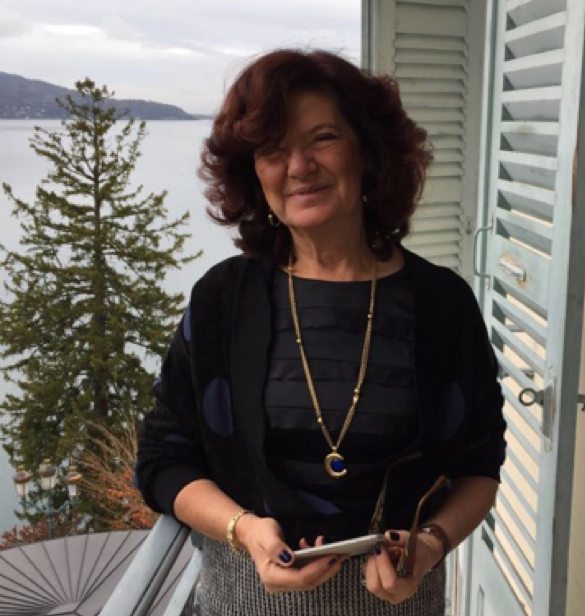Primo Levi (1919-1987)

The centennial of Primo Levi’s birth fell on the 31st July 2019. He died on the 11th April 1987 in Turin, where he was also born. “Fell the centennial” is not an expression he would have appreciated, for Primo liked simplicity and clarity, and, above all, the truth. Therefore, I’ll make a fresh start: Primo Levi was born on the 31st July 1919, one hundred years ago, in Turin. He was a chemist, writer and an extraordinary witness and survivor of the Holocaust, one of the greatest tragedies of the 20th century.
Primo was given the task to bear witness and tell, not so much what has been or should have or could have been, this he did later, much later. The task he was given was to tell the truth, as it had been, and to narrate the infinite forms the course of history can take with complete disregard for the men of good will.
And now I would like to address four key points:
1) The mountains
“For me, the years in the mountains have coincided with the years of my youth, and therefore with dangers and suffering. It has been a valuable experience for me, because precisely in the mountains I have learned some fundamental virtues: patience, obstinacy, endurance”. This is what Primo told Giorgio Calcagno, a journalist with “La Stampa”, in 1982.
2) The Adventure
During a conversation with Philip Roth he said: “The family, the house, the factory are good things per se, but they have deprived me of something which I still miss, that is adventure.” He narrates the adventure especially in that extraordinary book about his journey home, The Truce, an adventure “experienced in the midst of a Europe still devastated by war”.
And now, I cannot but go on to the third key point, which I could have made the first, because from there started Primo’s experience as a writer.
3) The Lager
“If This Is a Man”
The duty to bear witness and to tell, together with the fear of not being believed or listened to, are perceptions assailing Primo from the first moment. “Then for the first time we became aware that our language lacks words to express this offence, the demolition of man”. Primo looks for the words to describe what he is experiencing, the people he meets, the episodes he witnesses or of which he is the protagonist. “My task was to understand”.
4) The psychoanalysis
One of his dearest friends, Luciana Nissim Momigliano, who was caught and sent to Auschwitz with him from Fossoli, and who, like him, also luckily survived, became one of the cleverest and most respected Italian psychoanalysts. Luciana used to say: “Primo, the highest witness”, and she would leave with him the task of transmitting what had been. Upon his death, Luciana would tell more about her own experience, however, she wouldn’t resort to psychoanalytic tools to tackle the issue of absolute evil. Other colleagues have, with excellent results which are very useful for us and, I would dare say, for civil society. (Grubrich-Simitis, 1979, Niederland, 1968, 1981, Bergmann, 1986, Laub, 1998, Kestenberg, 1972; Klein, 1971; Laufer, 1973, Kogan, 1995; 1998, Micheels, 1985, Kinston & Cohen, 1986).
However, I do not wish to deal with this now, rather with what Primo would jokingly call “my id”: “There is a trace of the id in me too ….” (The Search for Roots)
Primo considered himself (The Search for Roots) “someone who has read a great deal, above all in my apprentice years which in memory seem strangely extended; as if time, then, could be stretched like an elastic band, doubled, tripled. Maybe the same occurs to animals with a short life and quick turnover... generally in everyone who manages, in the same span of time, to do and perceive more things than the average middle-aged man: subjective time becomes longer.” “strangely, (in writing and in reporting what books had been his roots and in discovering how hybrid these roots were) I felt more exposed to the public, more unbosomed… I felt naked… choosing… I had not realised it was so relevant … I am aware that the choice of one’s roots is more nocturnal work, visceral and for the most part unconscious”.
In conclusion, the need to understand, to explain and to tell, which had so urgently forced Primo to write and bear witness, was for him “a lucid aware[ness] and daily work”, the lucid and rational search for “certain aspects of the human soul”.
The need, I can add, to give sense and logic to a moment in his life when everything seemed to have lost both.
In his books he uses extraordinary epic descriptions (it is not by chance that the Odyssey is among his books of first choice) as well as picaresque stories (Rabelais again) to describe the characters he encountered in the concentration camp. As in his life, the characters on the printed page were real, so now he does the reverse. By writing about these figures, he makes them become real. Such as the three-year-old boy Hurbinek, who died in Auschwitz of typhus fever when the liberation came. Hurbinek could not speak, because nobody had bothered to teach him, but he had a gaze savage and human, even mature, a judgement (If This is a Man). These figures come out of the theatre of the absurd and become part of our suffering humanity. Written, read, they go beyond the unspeakable, the horrifying, the gas chamber, the final selection: “I felt closer to the dead than to the living, and felt guilty for being a man, because men had built Auschwitz… It seemed to me that I would be purified by telling …” (in Chrome, in The Periodic Table).
Therefore, for a long time, Primo does not resort to the unconscious, but looks for the stream of consciousness, the lucidity of reason, the intact spirit of enlightenment which relentlessly continues to have confidence in mankind and the human community. There is no rhetoric in his writings, but there are pages of powerful narrative strength, never declamatory, never a rough or explicit description, of the gas chambers or of the agonies of the endless deaths.
Yet the brief chapters making up the plot of If This is a Man already reveal what Primo’s style, his literary and psychological quality will be like later. Primo writes often during the thirty years he’s working as a chemist, slowly becoming a professional writer. However, apart from the novel “If Not Now, When?”, all his writings are short stories, and as many as two books, written under the pen name Damiano Malabaila, are sci-fi or fantasy stories. But it is here, in my opinion, that something unheimlich is revealed, an unsettling way of turning everyday images into surreal incidents which take the reader by surprise. And almost all these stories reveal a bitter undertone in the reflections upon the crookedness of the human soul. The concentration camp, which is elusive in its brutal dehumanisation when described as such, resurfaces in these short stories where reality is bent and transformed into something obscure and disturbing. In my view, in these short stories, something of that id is revealed, which Primo anxiously tries to conceal in his books and short stories dealing with the concentration camp universe. There, in the absolute dehumanisation of the concentration camp, Primo always looks for and finds, with curiosity and passion, the hidden humanity, the communal love, the generosity and the curiosity towards the civilisation buried in every human being, even if transformed into a non-human. The fantasy stories, instead, reveal the horror of the deformation of reality, the exclusion of those who are different, the annihilation of the enemy.
In conclusion, the dark side of Primo becomes apparent when he deals with fantasy stories, whereas his clear side is there when he recounts as a witness the horrors of the camp.
It can be said that Auschwitz never leaves him. As he said many times: “It happened, so it can happen again. This is the essence of what we have to say” (The Drowned and the Saved).
Finally, the recurring dream he puts at the end of The Truce: “There is a grey and murky nothingness, and, at once I know what it means, and I know I’ve always known it: I am once again in the camp, nothing outside the camp was true... I hear the sound of a word I know well: the sound of one word... It is the order at dawn in Auschwitz, a foreign word, a word that is feared and expected: ‘Wstavać’, Get up’”.
So, we can assume that this nothingness, grey and murky, which Primo experienced and fought with the weapons of civilisation and tolerance, contained a never forgotten order given at dawn. As Celan wrote:
Black milk of daybreak we drink it at evening
we drink it at midday and morning we drink it at night
we drink and we drink
we shovel a grave in the air where you won’t lie too cramped
(Paul Celan, 1945, "Todesfuge", Death Fugue)
I don’t want to talk about Primo Levi’s death and its circumstances. I respect the silence of his family and of the most part, of his biographers.
In his only fully-fledged novel, “If Not Now, When?”, through the character of Francine, Primo says:
“It’s difficult to explain. It’s a feeling that the others died in your stead; as if you were alive free of charge, out of some privilege you never earned, out of some abuse you did to the dead. Being alive is not a crime, but we feel it as a crime”.
O Auschwitz, ich kann dich nicht vergessen, weil du mein Schicksal bist...
O Auschwitz, I cannot forget you because you are my destiny …
(camp song)
 Simonetta Diena, psychiatrist and psychoanalyst, is a full member with training functions of the SPI and the IPA. She has been working for many years in the field of eating disorders and her works have appeared in national and international journals and in collected volumes dealing with the problems connected with these disorders. She is a teacher with the Istituto Italiano di Psicoanalisi di Gruppo (IIPG) in Milan and, since 1999, a Fellow in the IPA Research Training Programme. For years she has also been dealing with art and psychoanalysis and has authored a number of essays on this topic as well as articles published in national and international journals. Her latest book is “Psychoanalysis listening to Love” Karnac. She lives and works in Milan.
Simonetta Diena, psychiatrist and psychoanalyst, is a full member with training functions of the SPI and the IPA. She has been working for many years in the field of eating disorders and her works have appeared in national and international journals and in collected volumes dealing with the problems connected with these disorders. She is a teacher with the Istituto Italiano di Psicoanalisi di Gruppo (IIPG) in Milan and, since 1999, a Fellow in the IPA Research Training Programme. For years she has also been dealing with art and psychoanalysis and has authored a number of essays on this topic as well as articles published in national and international journals. Her latest book is “Psychoanalysis listening to Love” Karnac. She lives and works in Milan.